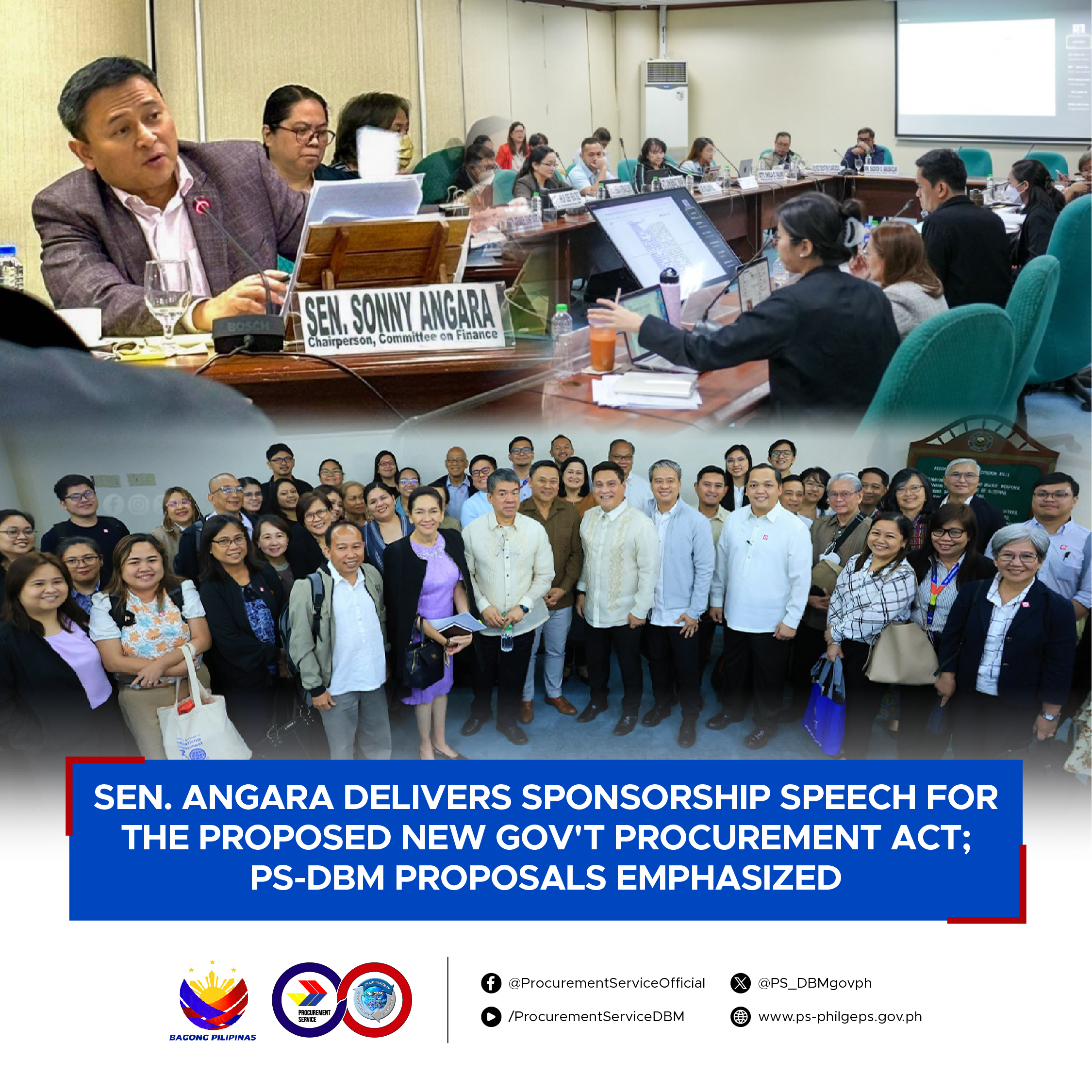
In his speech during a plenary session on March 11, 2024, Senate Committee on Finance Chairperson Senator Juan Edgardo "Sonny" Angara officially sponsored Senate Bill No. 2593, or the proposed New Government Procurement Act (NGPA). This followed the conduct of three (3) public hearings and ten (10) technical working group meetings which resulted in the introduction of concepts and modalities that will streamline the procurement process for the benefit of government agencies and other stakeholders.
The proposed framework, considered a priority by the Legislative Executive Development Advisory Council, includes key reforms which shall make public procurement more efficient and effective, and are aimed at putting an end to side deals, under-the-table agreements, uncompetitive behavior, corruption, and other criminal activities. Consequently, the government will be more responsive to the needs of Filipinos.
“Mas bibilis at magiging mas epektibo ang procurement ng gobyerno. At sa ganitong paraan, iigting ang kapasidad ng gobyerno para tugunan ang pangangailangan ng sambayanang Pilipino. At kapag lalong gumanda at bumilis ang pag-responde, mas lalalim ang tiwala at panatag ng loob ng taong bayan sa ating gobyerno,” said Senator Sonny Angara in a statement.

The Procurement Service - Department of Budget and Management (PS-DBM), headed by Executive Director (ED) Dennis S. Santiago, takes pride in Sen. Angara’s sponsorship. Acting as the central procuring arm for common-use supplies and equipment (CSE) of the whole of government, PS-DBM contributed significantly in drafting the bill.
New modes of procurement introduced
The NGPA introduces new procurement modes.
Direct acquisition, for one, allows a procuring entity to procure directly its required goods and services from any known and reputable source. Direct sales, on the other hand, allows a procuring entity to purchase directly from a supplier who has satisfactorily delivered goods and services of similar set of specifications to another procuring entity.
PS-DBM also proposed the competitive dialogue mode where the procuring entity invites suppliers, contractors, and consultants to propose solutions to address agency needs, where participants shall submit their respective bids based on identified solutions specified during the dialogue. Unsolicited offer with bid matching, meanwhile, allows a procuring entity to consider an unsolicited offer involving a new concept or technology and invite competitive or comparative bids. A procurement mode to address and streamline unique procurement requirements involving science, technology, and innovation was likewise proposed.
ED Santiago emphasized that these new modalities shall make procurement proportional not only to the needs of the procuring entity but also to the nature of the contract or project to be procured.

The concept of most economically advantageous and responsive bid (MEARB) is introduced. This may be utilized when the consideration of assigning weights for the technical and financial aspects of the project shall be more appropriate to recognize both the qualitative and economic values of the bid. The MEARB proposal has garnered positive feedback from different agencies.
Procurement in the digital age
In line with DBM Secretary Amenah F. Pangandaman’s emphasis on digitalization and innovation as the heart of the NGPA, PS-DBM’s electronic marketplace, or the eMarketplace, is also showcased. The eMarketplace shall digitalize the procurement of CSE by serving as the government e-commerce platform. Sec. Pangandaman, on various occasions, has repeatedly stressed that digital transformation shall bring in accessibility, convenience, efficiency, and transparency to budget utilization and procurement process.
Modernizing the central procurement system of the PS-DBM, primarily undertaken by its Philippine Government Electronic Procurement System (PhilGEPS) Group, is also in line with the President’s directive to make public procurement “attuned to the changing times,” which he expressed in the last State of the Nation Address (SONA).
Echoing the words of the DBM Secretary, Sen. Angara agrees that the proposed bill will be “taking public procurement to the next level.” In addition, he said, “In truth, this effort is about taking governance to the next level.”
Government agencies welcome PS-DBM’s proposals
Before Sen. Angara officially sponsored the proposed NGPA, series of public hearings and technical working group meetings were held. In these gatherings, various government agencies provided their insights on the proposed amendments of PS-DBM.

The Philippine Association of State Universities and Colleges (PASUC) manifested its strong support for the bill, especially the introduction of new modes of procurement. “We greatly appreciate the inclusion of special provisions on the procurement of highly technical materials and equipment for research and innovation,” PASUC representative Atty. Luzviminda Rosales said.
The Philippine Pharma Procurement, Inc. of the Department of Trade and Industry, represented by its Vice President for Administration Josefina Riel, likewise voiced its approval for the inclusion of direct sales among the new procurement modes. “We also welcome the new procurement modalities introduced, especially direct sales, because this will save time for most of the hospitals as they won't have to undergo the public competitive bidding anymore,” she said.
Many other agencies, meanwhile, also expressed their agreement with the concept of MEARB, which will factor in both quality and cost, in order to address issues encountered with the existing award criterion under the current legal framework.
“We express our endless gratitude to Finance Committee Chairperson Senator Sonny Angara for sponsoring the proposed NGPA… Indeed, the perfect time to amend the decades-old procurement law is now,” Sec. Pangandaman said in her message.
ED Santiago, in these legislative hearings, was joined by other DBM officials along with Procurement Group Director Genmaries Entredicho-Caong, Operations Group Director Philip Josef Vera Cruz, PhilGEPS Director Maria Teresita Semana, Atty. Charlotte Vina Casinillo, Atty. Ramon Matibag, and Atty. Lyodychie Camarao.
